Murdoch University BSL305 Company Law Assignment: Funds and Directors
VerifiedAdded on 2022/08/18
|9
|2358
|9
Homework Assignment
AI Summary
This assignment solution addresses several key aspects of business law, focusing on the Corporations Act of 2001. It begins by explaining the necessity of a prospectus for raising funds, detailing its role as a disclosure document and the legal consequences of misleading information. The solution then examines share capital reduction and share buy-back regulations under section 256A, emphasizing fairness to shareholders and creditors. It also covers nominee directors, their responsibilities, and relevant case law, including Levin v Clark and Scottish Co-operative Wholesale Society Ltd v Meyer. Furthermore, the assignment analyzes director's duties, specifically addressing conflict of interest scenarios, such as when a director's husband is employed in an advertising campaign, and the application of section 191 of the Corporations Act. Finally, it examines the standard of care required of directors, referencing section 180 and the case of Daniels v AWA Ltd, emphasizing the need for directors to possess basic knowledge of the company's business. The assignment provides detailed legal analysis and case references to support its arguments.
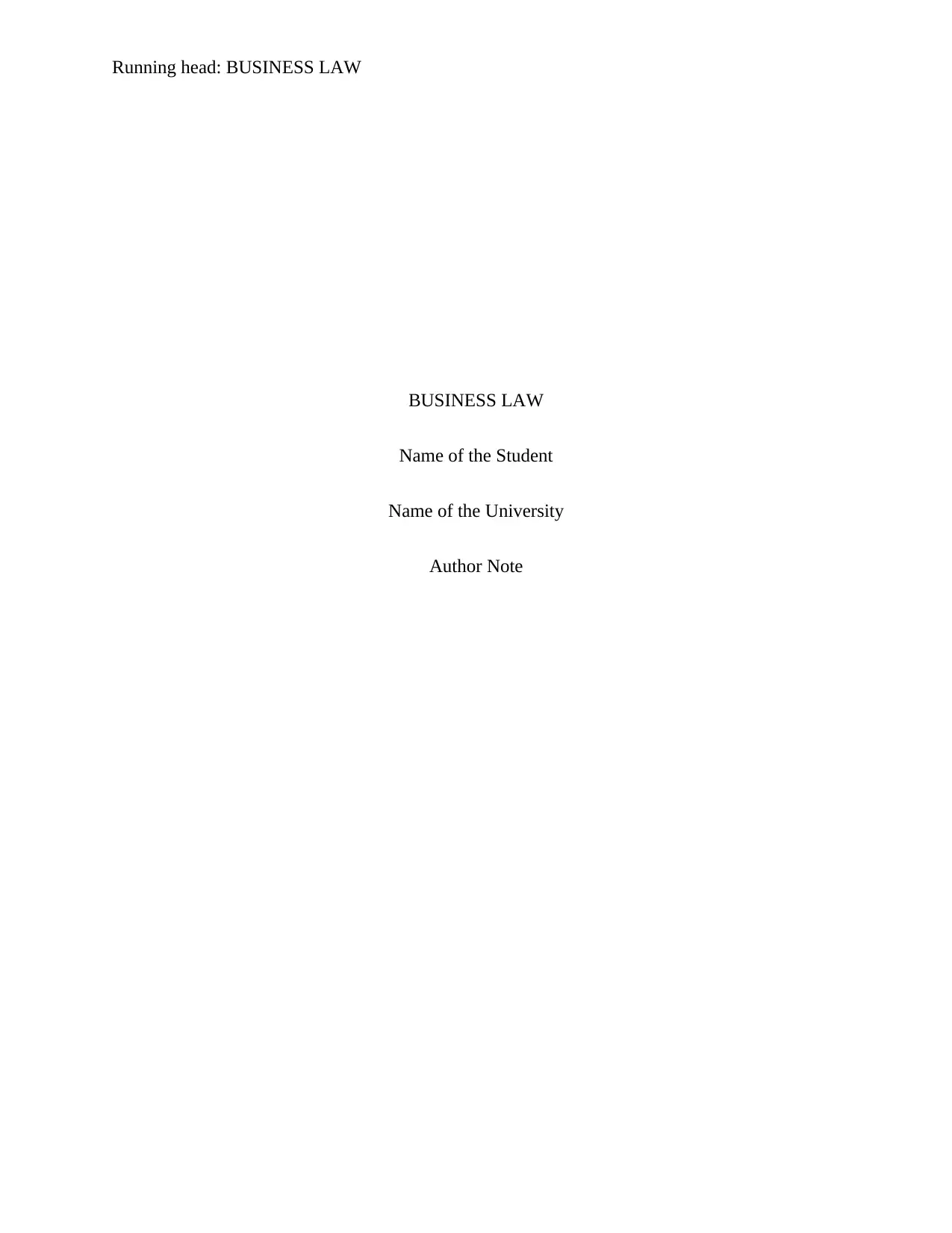
Running head: BUSINESS LAW
BUSINESS LAW
Name of the Student
Name of the University
Author Note
BUSINESS LAW
Name of the Student
Name of the University
Author Note
Paraphrase This Document
Need a fresh take? Get an instant paraphrase of this document with our AI Paraphraser
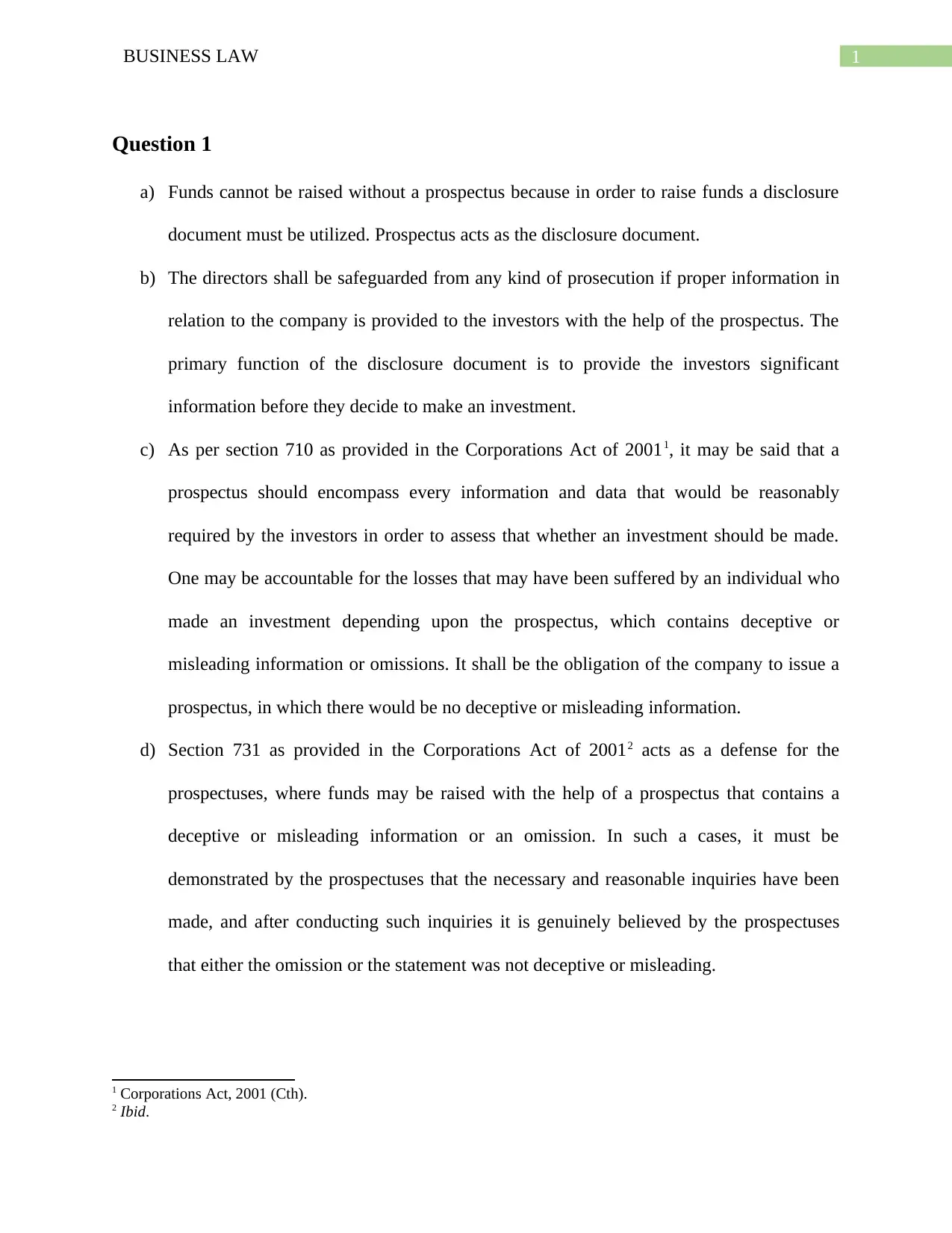
1BUSINESS LAW
Question 1
a) Funds cannot be raised without a prospectus because in order to raise funds a disclosure
document must be utilized. Prospectus acts as the disclosure document.
b) The directors shall be safeguarded from any kind of prosecution if proper information in
relation to the company is provided to the investors with the help of the prospectus. The
primary function of the disclosure document is to provide the investors significant
information before they decide to make an investment.
c) As per section 710 as provided in the Corporations Act of 20011, it may be said that a
prospectus should encompass every information and data that would be reasonably
required by the investors in order to assess that whether an investment should be made.
One may be accountable for the losses that may have been suffered by an individual who
made an investment depending upon the prospectus, which contains deceptive or
misleading information or omissions. It shall be the obligation of the company to issue a
prospectus, in which there would be no deceptive or misleading information.
d) Section 731 as provided in the Corporations Act of 20012 acts as a defense for the
prospectuses, where funds may be raised with the help of a prospectus that contains a
deceptive or misleading information or an omission. In such a cases, it must be
demonstrated by the prospectuses that the necessary and reasonable inquiries have been
made, and after conducting such inquiries it is genuinely believed by the prospectuses
that either the omission or the statement was not deceptive or misleading.
1 Corporations Act, 2001 (Cth).
2 Ibid.
Question 1
a) Funds cannot be raised without a prospectus because in order to raise funds a disclosure
document must be utilized. Prospectus acts as the disclosure document.
b) The directors shall be safeguarded from any kind of prosecution if proper information in
relation to the company is provided to the investors with the help of the prospectus. The
primary function of the disclosure document is to provide the investors significant
information before they decide to make an investment.
c) As per section 710 as provided in the Corporations Act of 20011, it may be said that a
prospectus should encompass every information and data that would be reasonably
required by the investors in order to assess that whether an investment should be made.
One may be accountable for the losses that may have been suffered by an individual who
made an investment depending upon the prospectus, which contains deceptive or
misleading information or omissions. It shall be the obligation of the company to issue a
prospectus, in which there would be no deceptive or misleading information.
d) Section 731 as provided in the Corporations Act of 20012 acts as a defense for the
prospectuses, where funds may be raised with the help of a prospectus that contains a
deceptive or misleading information or an omission. In such a cases, it must be
demonstrated by the prospectuses that the necessary and reasonable inquiries have been
made, and after conducting such inquiries it is genuinely believed by the prospectuses
that either the omission or the statement was not deceptive or misleading.
1 Corporations Act, 2001 (Cth).
2 Ibid.
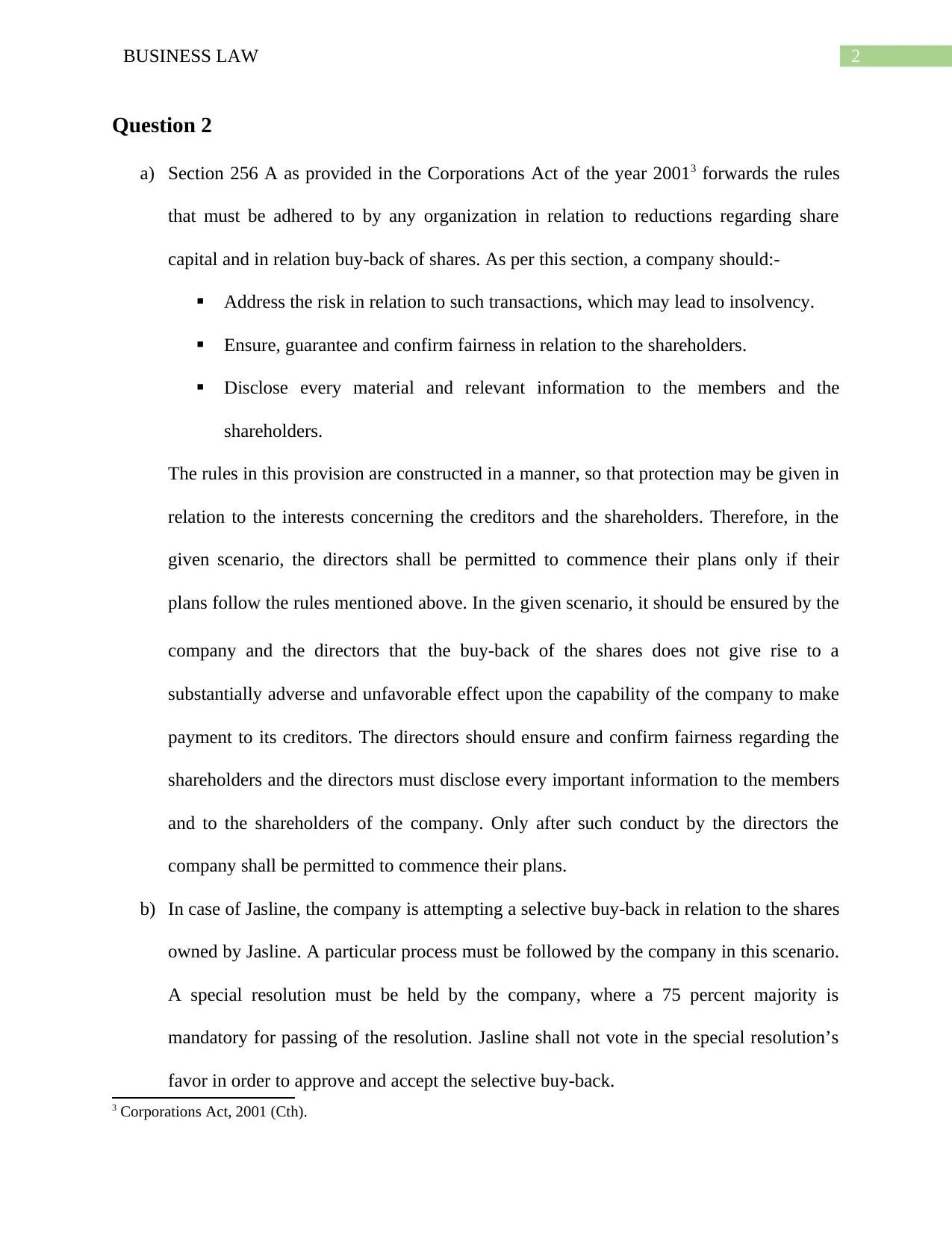
2BUSINESS LAW
Question 2
a) Section 256 A as provided in the Corporations Act of the year 20013 forwards the rules
that must be adhered to by any organization in relation to reductions regarding share
capital and in relation buy-back of shares. As per this section, a company should:-
Address the risk in relation to such transactions, which may lead to insolvency.
Ensure, guarantee and confirm fairness in relation to the shareholders.
Disclose every material and relevant information to the members and the
shareholders.
The rules in this provision are constructed in a manner, so that protection may be given in
relation to the interests concerning the creditors and the shareholders. Therefore, in the
given scenario, the directors shall be permitted to commence their plans only if their
plans follow the rules mentioned above. In the given scenario, it should be ensured by the
company and the directors that the buy-back of the shares does not give rise to a
substantially adverse and unfavorable effect upon the capability of the company to make
payment to its creditors. The directors should ensure and confirm fairness regarding the
shareholders and the directors must disclose every important information to the members
and to the shareholders of the company. Only after such conduct by the directors the
company shall be permitted to commence their plans.
b) In case of Jasline, the company is attempting a selective buy-back in relation to the shares
owned by Jasline. A particular process must be followed by the company in this scenario.
A special resolution must be held by the company, where a 75 percent majority is
mandatory for passing of the resolution. Jasline shall not vote in the special resolution’s
favor in order to approve and accept the selective buy-back.
3 Corporations Act, 2001 (Cth).
Question 2
a) Section 256 A as provided in the Corporations Act of the year 20013 forwards the rules
that must be adhered to by any organization in relation to reductions regarding share
capital and in relation buy-back of shares. As per this section, a company should:-
Address the risk in relation to such transactions, which may lead to insolvency.
Ensure, guarantee and confirm fairness in relation to the shareholders.
Disclose every material and relevant information to the members and the
shareholders.
The rules in this provision are constructed in a manner, so that protection may be given in
relation to the interests concerning the creditors and the shareholders. Therefore, in the
given scenario, the directors shall be permitted to commence their plans only if their
plans follow the rules mentioned above. In the given scenario, it should be ensured by the
company and the directors that the buy-back of the shares does not give rise to a
substantially adverse and unfavorable effect upon the capability of the company to make
payment to its creditors. The directors should ensure and confirm fairness regarding the
shareholders and the directors must disclose every important information to the members
and to the shareholders of the company. Only after such conduct by the directors the
company shall be permitted to commence their plans.
b) In case of Jasline, the company is attempting a selective buy-back in relation to the shares
owned by Jasline. A particular process must be followed by the company in this scenario.
A special resolution must be held by the company, where a 75 percent majority is
mandatory for passing of the resolution. Jasline shall not vote in the special resolution’s
favor in order to approve and accept the selective buy-back.
3 Corporations Act, 2001 (Cth).
⊘ This is a preview!⊘
Do you want full access?
Subscribe today to unlock all pages.

Trusted by 1+ million students worldwide
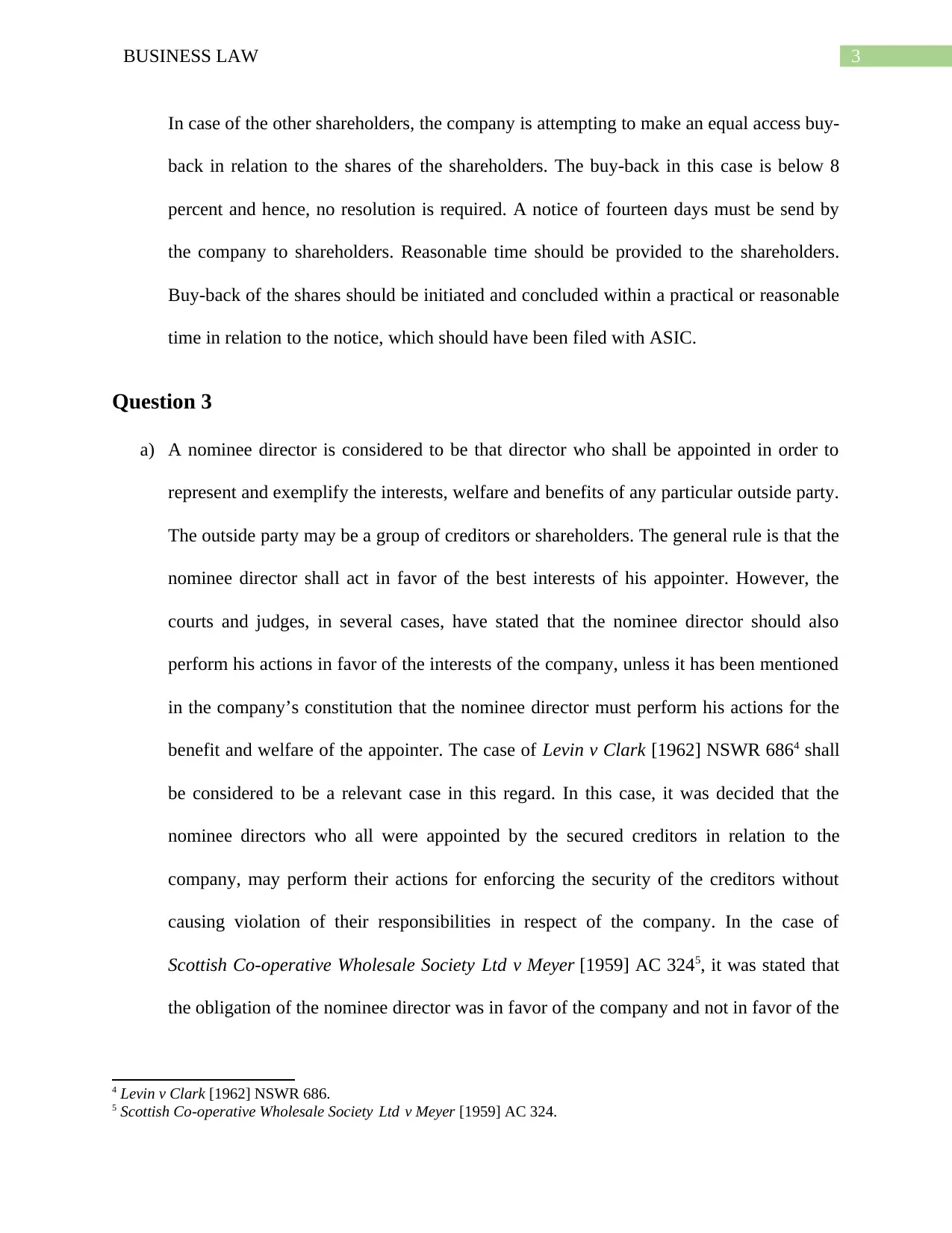
3BUSINESS LAW
In case of the other shareholders, the company is attempting to make an equal access buy-
back in relation to the shares of the shareholders. The buy-back in this case is below 8
percent and hence, no resolution is required. A notice of fourteen days must be send by
the company to shareholders. Reasonable time should be provided to the shareholders.
Buy-back of the shares should be initiated and concluded within a practical or reasonable
time in relation to the notice, which should have been filed with ASIC.
Question 3
a) A nominee director is considered to be that director who shall be appointed in order to
represent and exemplify the interests, welfare and benefits of any particular outside party.
The outside party may be a group of creditors or shareholders. The general rule is that the
nominee director shall act in favor of the best interests of his appointer. However, the
courts and judges, in several cases, have stated that the nominee director should also
perform his actions in favor of the interests of the company, unless it has been mentioned
in the company’s constitution that the nominee director must perform his actions for the
benefit and welfare of the appointer. The case of Levin v Clark [1962] NSWR 6864 shall
be considered to be a relevant case in this regard. In this case, it was decided that the
nominee directors who all were appointed by the secured creditors in relation to the
company, may perform their actions for enforcing the security of the creditors without
causing violation of their responsibilities in respect of the company. In the case of
Scottish Co-operative Wholesale Society Ltd v Meyer [1959] AC 3245, it was stated that
the obligation of the nominee director was in favor of the company and not in favor of the
4 Levin v Clark [1962] NSWR 686.
5 Scottish Co-operative Wholesale Society Ltd v Meyer [1959] AC 324.
In case of the other shareholders, the company is attempting to make an equal access buy-
back in relation to the shares of the shareholders. The buy-back in this case is below 8
percent and hence, no resolution is required. A notice of fourteen days must be send by
the company to shareholders. Reasonable time should be provided to the shareholders.
Buy-back of the shares should be initiated and concluded within a practical or reasonable
time in relation to the notice, which should have been filed with ASIC.
Question 3
a) A nominee director is considered to be that director who shall be appointed in order to
represent and exemplify the interests, welfare and benefits of any particular outside party.
The outside party may be a group of creditors or shareholders. The general rule is that the
nominee director shall act in favor of the best interests of his appointer. However, the
courts and judges, in several cases, have stated that the nominee director should also
perform his actions in favor of the interests of the company, unless it has been mentioned
in the company’s constitution that the nominee director must perform his actions for the
benefit and welfare of the appointer. The case of Levin v Clark [1962] NSWR 6864 shall
be considered to be a relevant case in this regard. In this case, it was decided that the
nominee directors who all were appointed by the secured creditors in relation to the
company, may perform their actions for enforcing the security of the creditors without
causing violation of their responsibilities in respect of the company. In the case of
Scottish Co-operative Wholesale Society Ltd v Meyer [1959] AC 3245, it was stated that
the obligation of the nominee director was in favor of the company and not in favor of the
4 Levin v Clark [1962] NSWR 686.
5 Scottish Co-operative Wholesale Society Ltd v Meyer [1959] AC 324.
Paraphrase This Document
Need a fresh take? Get an instant paraphrase of this document with our AI Paraphraser
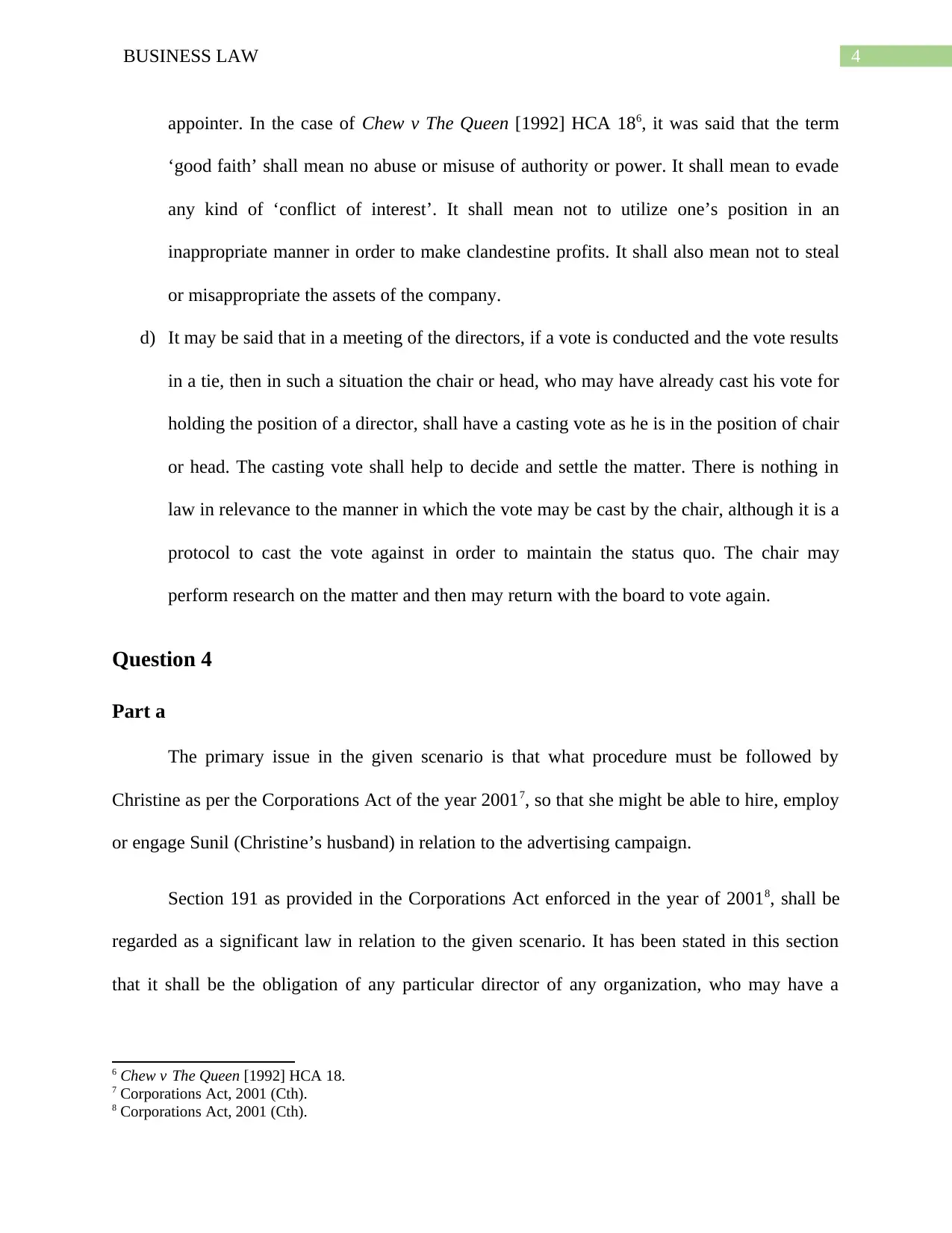
4BUSINESS LAW
appointer. In the case of Chew v The Queen [1992] HCA 186, it was said that the term
‘good faith’ shall mean no abuse or misuse of authority or power. It shall mean to evade
any kind of ‘conflict of interest’. It shall mean not to utilize one’s position in an
inappropriate manner in order to make clandestine profits. It shall also mean not to steal
or misappropriate the assets of the company.
d) It may be said that in a meeting of the directors, if a vote is conducted and the vote results
in a tie, then in such a situation the chair or head, who may have already cast his vote for
holding the position of a director, shall have a casting vote as he is in the position of chair
or head. The casting vote shall help to decide and settle the matter. There is nothing in
law in relevance to the manner in which the vote may be cast by the chair, although it is a
protocol to cast the vote against in order to maintain the status quo. The chair may
perform research on the matter and then may return with the board to vote again.
Question 4
Part a
The primary issue in the given scenario is that what procedure must be followed by
Christine as per the Corporations Act of the year 20017, so that she might be able to hire, employ
or engage Sunil (Christine’s husband) in relation to the advertising campaign.
Section 191 as provided in the Corporations Act enforced in the year of 20018, shall be
regarded as a significant law in relation to the given scenario. It has been stated in this section
that it shall be the obligation of any particular director of any organization, who may have a
6 Chew v The Queen [1992] HCA 18.
7 Corporations Act, 2001 (Cth).
8 Corporations Act, 2001 (Cth).
appointer. In the case of Chew v The Queen [1992] HCA 186, it was said that the term
‘good faith’ shall mean no abuse or misuse of authority or power. It shall mean to evade
any kind of ‘conflict of interest’. It shall mean not to utilize one’s position in an
inappropriate manner in order to make clandestine profits. It shall also mean not to steal
or misappropriate the assets of the company.
d) It may be said that in a meeting of the directors, if a vote is conducted and the vote results
in a tie, then in such a situation the chair or head, who may have already cast his vote for
holding the position of a director, shall have a casting vote as he is in the position of chair
or head. The casting vote shall help to decide and settle the matter. There is nothing in
law in relevance to the manner in which the vote may be cast by the chair, although it is a
protocol to cast the vote against in order to maintain the status quo. The chair may
perform research on the matter and then may return with the board to vote again.
Question 4
Part a
The primary issue in the given scenario is that what procedure must be followed by
Christine as per the Corporations Act of the year 20017, so that she might be able to hire, employ
or engage Sunil (Christine’s husband) in relation to the advertising campaign.
Section 191 as provided in the Corporations Act enforced in the year of 20018, shall be
regarded as a significant law in relation to the given scenario. It has been stated in this section
that it shall be the obligation of any particular director of any organization, who may have a
6 Chew v The Queen [1992] HCA 18.
7 Corporations Act, 2001 (Cth).
8 Corporations Act, 2001 (Cth).
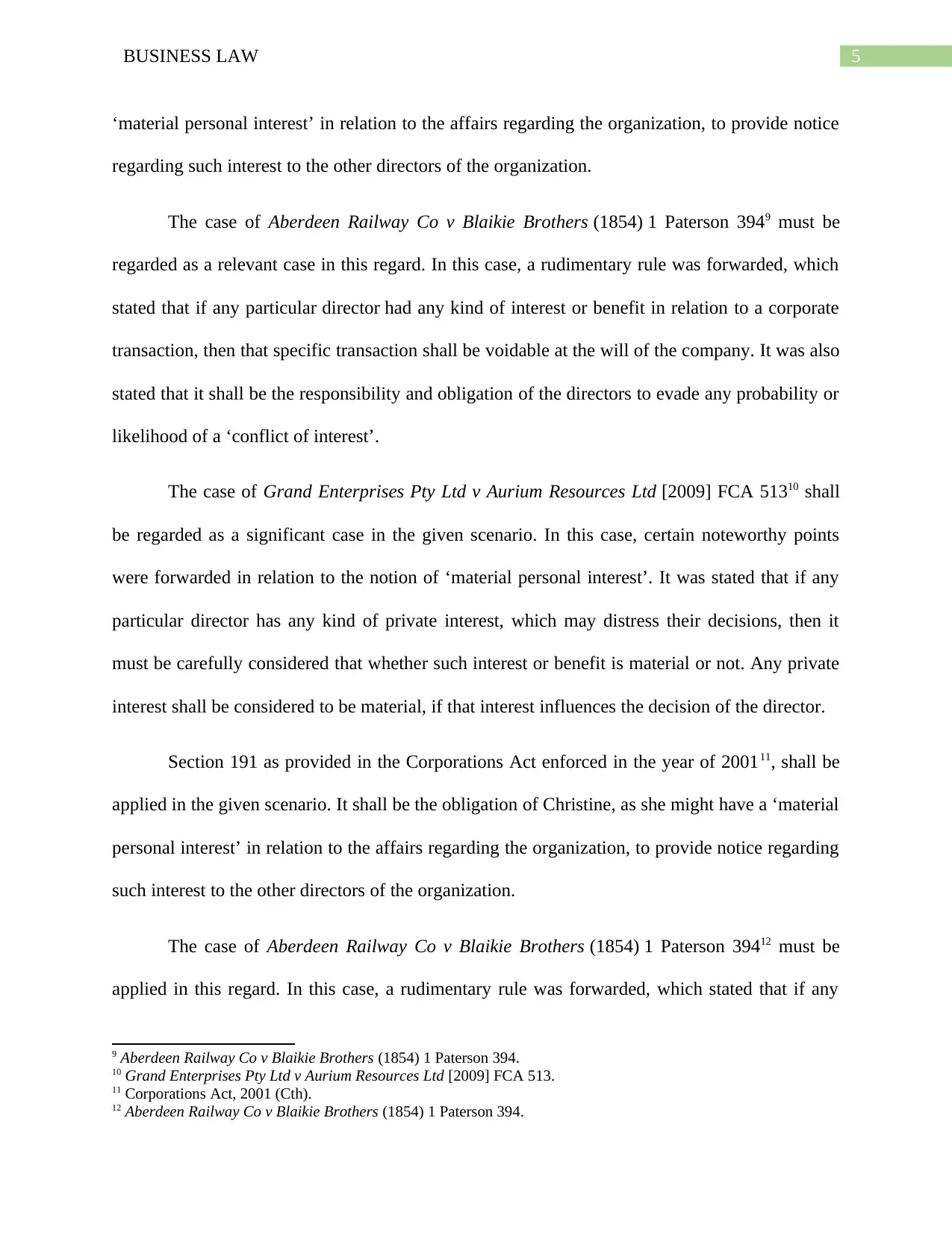
5BUSINESS LAW
‘material personal interest’ in relation to the affairs regarding the organization, to provide notice
regarding such interest to the other directors of the organization.
The case of Aberdeen Railway Co v Blaikie Brothers (1854) 1 Paterson 3949 must be
regarded as a relevant case in this regard. In this case, a rudimentary rule was forwarded, which
stated that if any particular director had any kind of interest or benefit in relation to a corporate
transaction, then that specific transaction shall be voidable at the will of the company. It was also
stated that it shall be the responsibility and obligation of the directors to evade any probability or
likelihood of a ‘conflict of interest’.
The case of Grand Enterprises Pty Ltd v Aurium Resources Ltd [2009] FCA 51310 shall
be regarded as a significant case in the given scenario. In this case, certain noteworthy points
were forwarded in relation to the notion of ‘material personal interest’. It was stated that if any
particular director has any kind of private interest, which may distress their decisions, then it
must be carefully considered that whether such interest or benefit is material or not. Any private
interest shall be considered to be material, if that interest influences the decision of the director.
Section 191 as provided in the Corporations Act enforced in the year of 200111, shall be
applied in the given scenario. It shall be the obligation of Christine, as she might have a ‘material
personal interest’ in relation to the affairs regarding the organization, to provide notice regarding
such interest to the other directors of the organization.
The case of Aberdeen Railway Co v Blaikie Brothers (1854) 1 Paterson 39412 must be
applied in this regard. In this case, a rudimentary rule was forwarded, which stated that if any
9 Aberdeen Railway Co v Blaikie Brothers (1854) 1 Paterson 394.
10 Grand Enterprises Pty Ltd v Aurium Resources Ltd [2009] FCA 513.
11 Corporations Act, 2001 (Cth).
12 Aberdeen Railway Co v Blaikie Brothers (1854) 1 Paterson 394.
‘material personal interest’ in relation to the affairs regarding the organization, to provide notice
regarding such interest to the other directors of the organization.
The case of Aberdeen Railway Co v Blaikie Brothers (1854) 1 Paterson 3949 must be
regarded as a relevant case in this regard. In this case, a rudimentary rule was forwarded, which
stated that if any particular director had any kind of interest or benefit in relation to a corporate
transaction, then that specific transaction shall be voidable at the will of the company. It was also
stated that it shall be the responsibility and obligation of the directors to evade any probability or
likelihood of a ‘conflict of interest’.
The case of Grand Enterprises Pty Ltd v Aurium Resources Ltd [2009] FCA 51310 shall
be regarded as a significant case in the given scenario. In this case, certain noteworthy points
were forwarded in relation to the notion of ‘material personal interest’. It was stated that if any
particular director has any kind of private interest, which may distress their decisions, then it
must be carefully considered that whether such interest or benefit is material or not. Any private
interest shall be considered to be material, if that interest influences the decision of the director.
Section 191 as provided in the Corporations Act enforced in the year of 200111, shall be
applied in the given scenario. It shall be the obligation of Christine, as she might have a ‘material
personal interest’ in relation to the affairs regarding the organization, to provide notice regarding
such interest to the other directors of the organization.
The case of Aberdeen Railway Co v Blaikie Brothers (1854) 1 Paterson 39412 must be
applied in this regard. In this case, a rudimentary rule was forwarded, which stated that if any
9 Aberdeen Railway Co v Blaikie Brothers (1854) 1 Paterson 394.
10 Grand Enterprises Pty Ltd v Aurium Resources Ltd [2009] FCA 513.
11 Corporations Act, 2001 (Cth).
12 Aberdeen Railway Co v Blaikie Brothers (1854) 1 Paterson 394.
⊘ This is a preview!⊘
Do you want full access?
Subscribe today to unlock all pages.

Trusted by 1+ million students worldwide
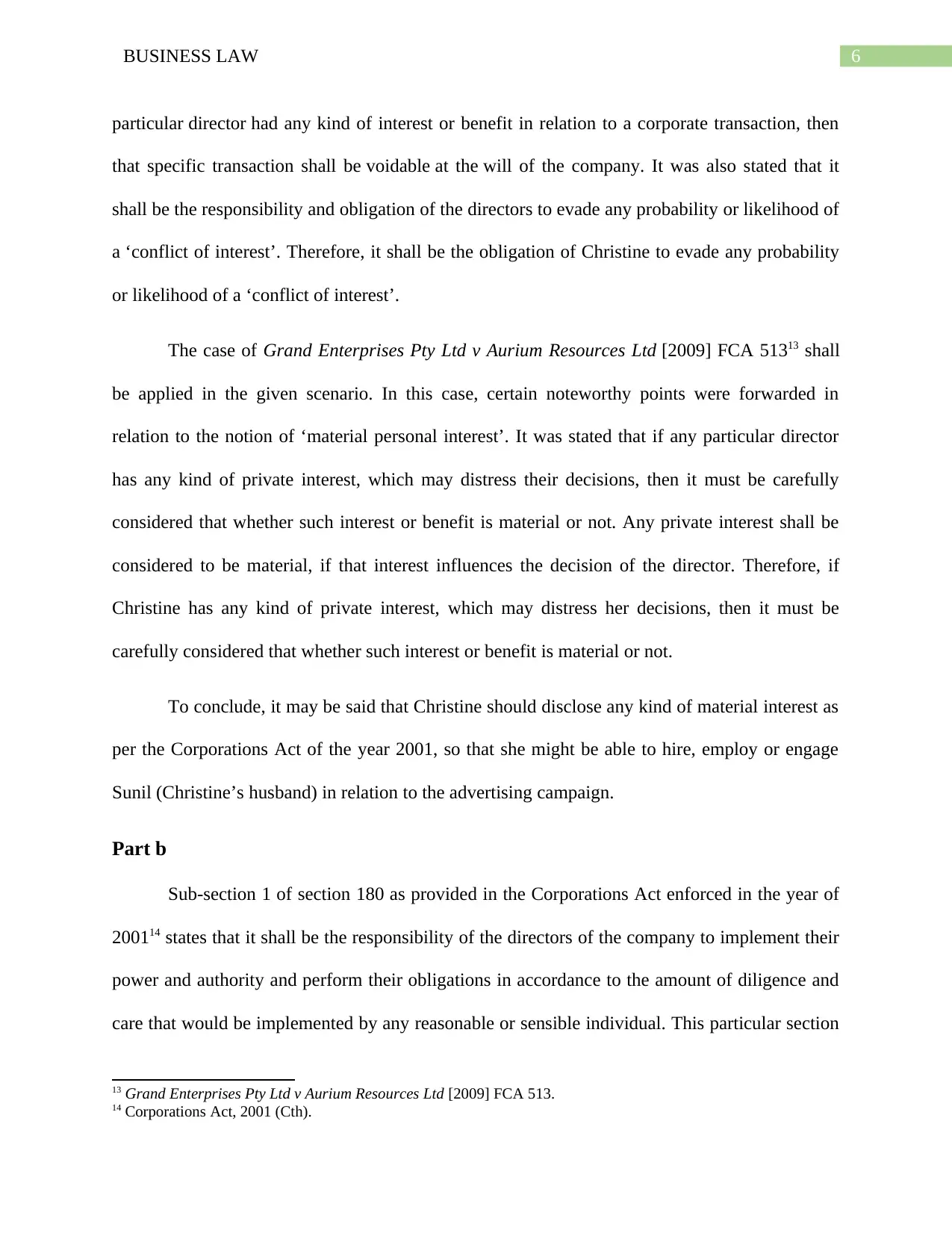
6BUSINESS LAW
particular director had any kind of interest or benefit in relation to a corporate transaction, then
that specific transaction shall be voidable at the will of the company. It was also stated that it
shall be the responsibility and obligation of the directors to evade any probability or likelihood of
a ‘conflict of interest’. Therefore, it shall be the obligation of Christine to evade any probability
or likelihood of a ‘conflict of interest’.
The case of Grand Enterprises Pty Ltd v Aurium Resources Ltd [2009] FCA 51313 shall
be applied in the given scenario. In this case, certain noteworthy points were forwarded in
relation to the notion of ‘material personal interest’. It was stated that if any particular director
has any kind of private interest, which may distress their decisions, then it must be carefully
considered that whether such interest or benefit is material or not. Any private interest shall be
considered to be material, if that interest influences the decision of the director. Therefore, if
Christine has any kind of private interest, which may distress her decisions, then it must be
carefully considered that whether such interest or benefit is material or not.
To conclude, it may be said that Christine should disclose any kind of material interest as
per the Corporations Act of the year 2001, so that she might be able to hire, employ or engage
Sunil (Christine’s husband) in relation to the advertising campaign.
Part b
Sub-section 1 of section 180 as provided in the Corporations Act enforced in the year of
200114 states that it shall be the responsibility of the directors of the company to implement their
power and authority and perform their obligations in accordance to the amount of diligence and
care that would be implemented by any reasonable or sensible individual. This particular section
13 Grand Enterprises Pty Ltd v Aurium Resources Ltd [2009] FCA 513.
14 Corporations Act, 2001 (Cth).
particular director had any kind of interest or benefit in relation to a corporate transaction, then
that specific transaction shall be voidable at the will of the company. It was also stated that it
shall be the responsibility and obligation of the directors to evade any probability or likelihood of
a ‘conflict of interest’. Therefore, it shall be the obligation of Christine to evade any probability
or likelihood of a ‘conflict of interest’.
The case of Grand Enterprises Pty Ltd v Aurium Resources Ltd [2009] FCA 51313 shall
be applied in the given scenario. In this case, certain noteworthy points were forwarded in
relation to the notion of ‘material personal interest’. It was stated that if any particular director
has any kind of private interest, which may distress their decisions, then it must be carefully
considered that whether such interest or benefit is material or not. Any private interest shall be
considered to be material, if that interest influences the decision of the director. Therefore, if
Christine has any kind of private interest, which may distress her decisions, then it must be
carefully considered that whether such interest or benefit is material or not.
To conclude, it may be said that Christine should disclose any kind of material interest as
per the Corporations Act of the year 2001, so that she might be able to hire, employ or engage
Sunil (Christine’s husband) in relation to the advertising campaign.
Part b
Sub-section 1 of section 180 as provided in the Corporations Act enforced in the year of
200114 states that it shall be the responsibility of the directors of the company to implement their
power and authority and perform their obligations in accordance to the amount of diligence and
care that would be implemented by any reasonable or sensible individual. This particular section
13 Grand Enterprises Pty Ltd v Aurium Resources Ltd [2009] FCA 513.
14 Corporations Act, 2001 (Cth).
Paraphrase This Document
Need a fresh take? Get an instant paraphrase of this document with our AI Paraphraser
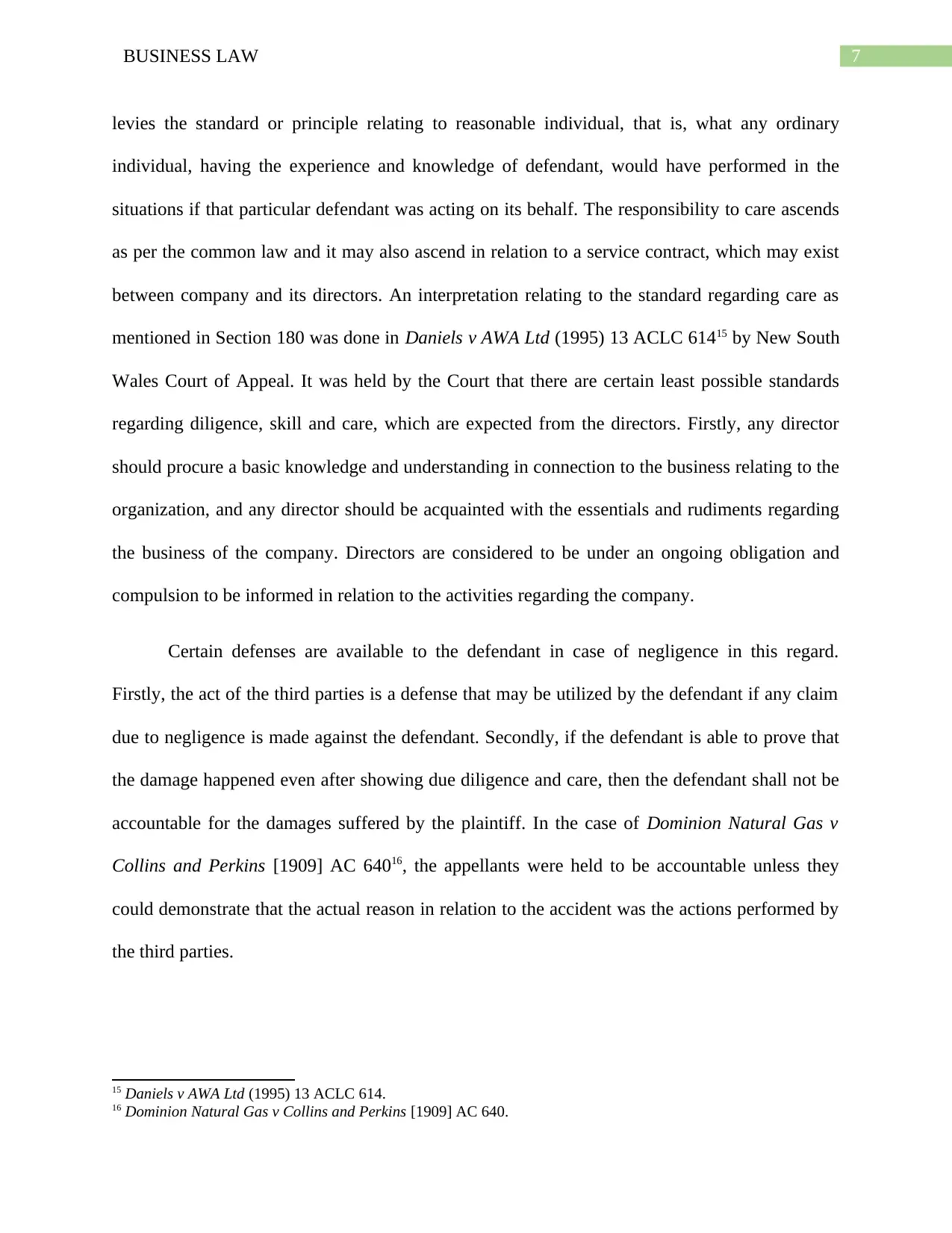
7BUSINESS LAW
levies the standard or principle relating to reasonable individual, that is, what any ordinary
individual, having the experience and knowledge of defendant, would have performed in the
situations if that particular defendant was acting on its behalf. The responsibility to care ascends
as per the common law and it may also ascend in relation to a service contract, which may exist
between company and its directors. An interpretation relating to the standard regarding care as
mentioned in Section 180 was done in Daniels v AWA Ltd (1995) 13 ACLC 61415 by New South
Wales Court of Appeal. It was held by the Court that there are certain least possible standards
regarding diligence, skill and care, which are expected from the directors. Firstly, any director
should procure a basic knowledge and understanding in connection to the business relating to the
organization, and any director should be acquainted with the essentials and rudiments regarding
the business of the company. Directors are considered to be under an ongoing obligation and
compulsion to be informed in relation to the activities regarding the company.
Certain defenses are available to the defendant in case of negligence in this regard.
Firstly, the act of the third parties is a defense that may be utilized by the defendant if any claim
due to negligence is made against the defendant. Secondly, if the defendant is able to prove that
the damage happened even after showing due diligence and care, then the defendant shall not be
accountable for the damages suffered by the plaintiff. In the case of Dominion Natural Gas v
Collins and Perkins [1909] AC 64016, the appellants were held to be accountable unless they
could demonstrate that the actual reason in relation to the accident was the actions performed by
the third parties.
15 Daniels v AWA Ltd (1995) 13 ACLC 614.
16 Dominion Natural Gas v Collins and Perkins [1909] AC 640.
levies the standard or principle relating to reasonable individual, that is, what any ordinary
individual, having the experience and knowledge of defendant, would have performed in the
situations if that particular defendant was acting on its behalf. The responsibility to care ascends
as per the common law and it may also ascend in relation to a service contract, which may exist
between company and its directors. An interpretation relating to the standard regarding care as
mentioned in Section 180 was done in Daniels v AWA Ltd (1995) 13 ACLC 61415 by New South
Wales Court of Appeal. It was held by the Court that there are certain least possible standards
regarding diligence, skill and care, which are expected from the directors. Firstly, any director
should procure a basic knowledge and understanding in connection to the business relating to the
organization, and any director should be acquainted with the essentials and rudiments regarding
the business of the company. Directors are considered to be under an ongoing obligation and
compulsion to be informed in relation to the activities regarding the company.
Certain defenses are available to the defendant in case of negligence in this regard.
Firstly, the act of the third parties is a defense that may be utilized by the defendant if any claim
due to negligence is made against the defendant. Secondly, if the defendant is able to prove that
the damage happened even after showing due diligence and care, then the defendant shall not be
accountable for the damages suffered by the plaintiff. In the case of Dominion Natural Gas v
Collins and Perkins [1909] AC 64016, the appellants were held to be accountable unless they
could demonstrate that the actual reason in relation to the accident was the actions performed by
the third parties.
15 Daniels v AWA Ltd (1995) 13 ACLC 614.
16 Dominion Natural Gas v Collins and Perkins [1909] AC 640.
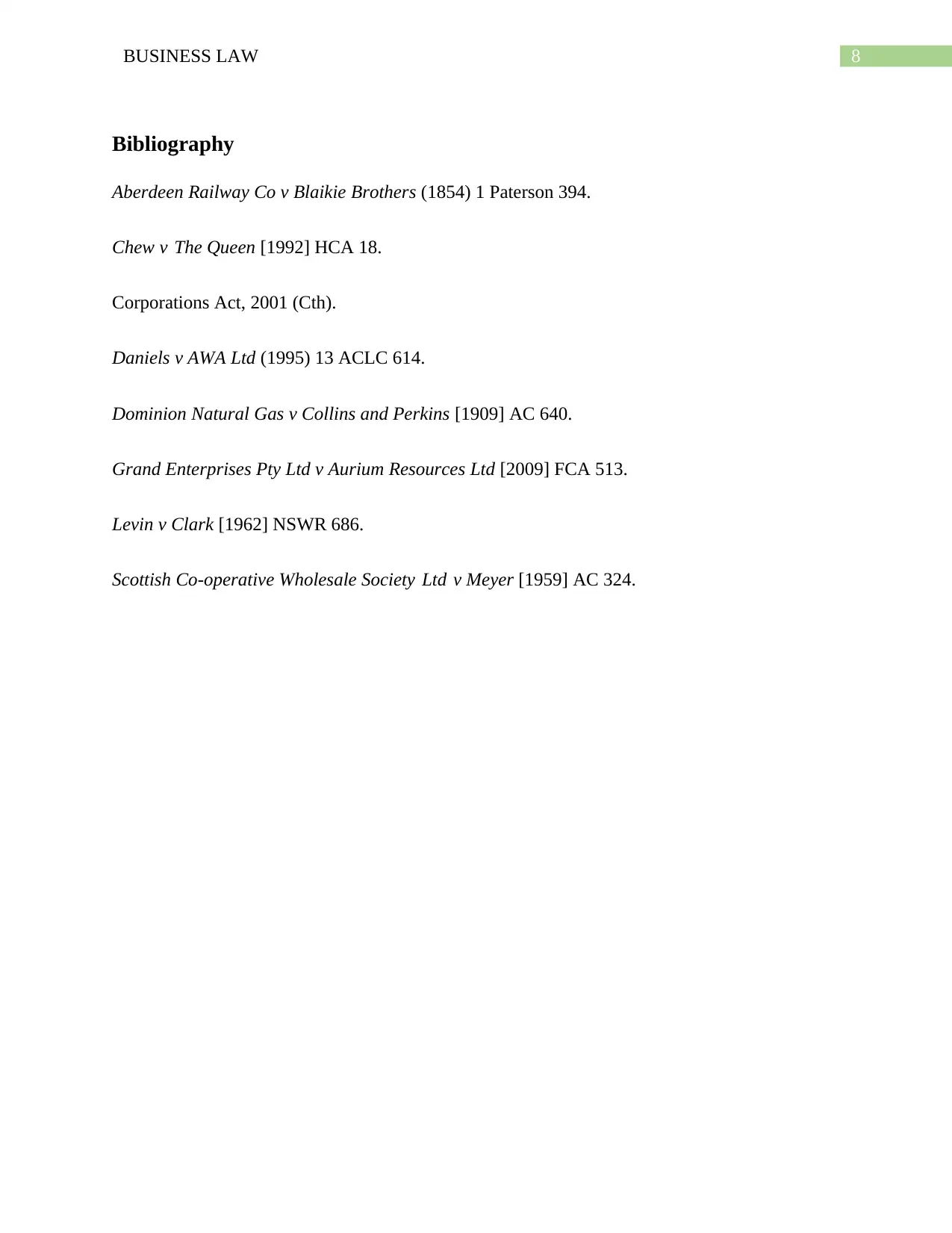
8BUSINESS LAW
Bibliography
Aberdeen Railway Co v Blaikie Brothers (1854) 1 Paterson 394.
Chew v The Queen [1992] HCA 18.
Corporations Act, 2001 (Cth).
Daniels v AWA Ltd (1995) 13 ACLC 614.
Dominion Natural Gas v Collins and Perkins [1909] AC 640.
Grand Enterprises Pty Ltd v Aurium Resources Ltd [2009] FCA 513.
Levin v Clark [1962] NSWR 686.
Scottish Co-operative Wholesale Society Ltd v Meyer [1959] AC 324.
Bibliography
Aberdeen Railway Co v Blaikie Brothers (1854) 1 Paterson 394.
Chew v The Queen [1992] HCA 18.
Corporations Act, 2001 (Cth).
Daniels v AWA Ltd (1995) 13 ACLC 614.
Dominion Natural Gas v Collins and Perkins [1909] AC 640.
Grand Enterprises Pty Ltd v Aurium Resources Ltd [2009] FCA 513.
Levin v Clark [1962] NSWR 686.
Scottish Co-operative Wholesale Society Ltd v Meyer [1959] AC 324.
⊘ This is a preview!⊘
Do you want full access?
Subscribe today to unlock all pages.

Trusted by 1+ million students worldwide
1 out of 9
Related Documents
Your All-in-One AI-Powered Toolkit for Academic Success.
+13062052269
info@desklib.com
Available 24*7 on WhatsApp / Email
![[object Object]](/_next/static/media/star-bottom.7253800d.svg)
Unlock your academic potential
Copyright © 2020–2026 A2Z Services. All Rights Reserved. Developed and managed by ZUCOL.





